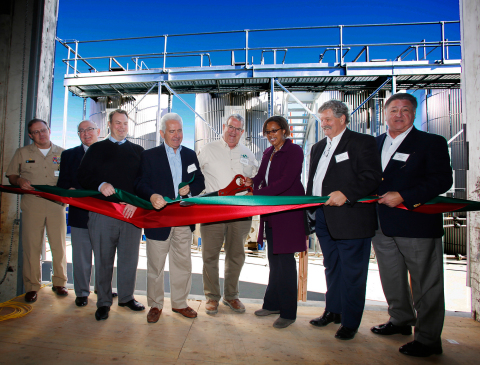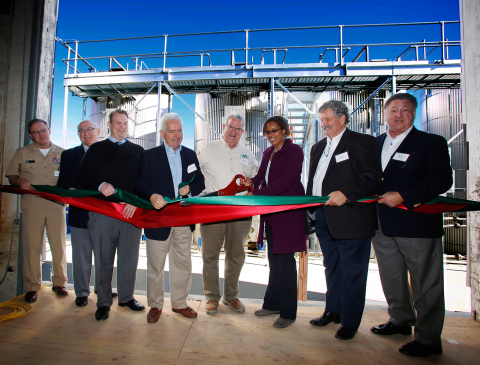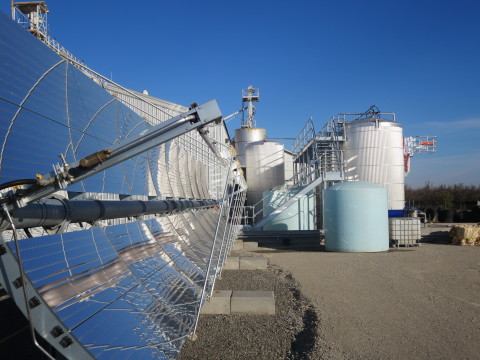FRESNO COUNTY, Calif. & VENTURA COUNTY, Calif.--(BUSINESS WIRE)--California is welcoming the world’s first fully sustainable liquid biofuel facility to help address energy needs and climate goals with an economically viable solution.
The new San Joaquin Valley-based facility, which is owned and operated by sustainable biofuel and bioenergy company Biodico Westside, will produce up to 20 million gallons of biodiesel per year, and create 45 direct jobs in partnership with West Hills Community College.
“Biodico Westside Facility is a result of years of research and development to produce biofuels that make good environmental, social and business sense,” said Biodico President and Founder Russ Teall. “Today, we are forging a new path in biofuel production by utilizing sustainable solutions to convert diverse feedstocks into renewable sources of fuel and energy.”
Biodico Westside is located at Red Rock Ranch in Five Points, Calif., which is in one of the world’s most productive agricultural regions. The facility operates entirely on renewable heat and power and incorporates advanced real-time and remote monitoring leading to complete system automation. In addition to processing multi-feedstocks, including used cooking oil, vegetable oil, and animal fats to name a few, the facility also utilizes anaerobic digestion, gasification and an advanced utility scale solar cogeneration system.
“We developed proprietary technology to greatly enhance the economics of producing high-quality biodiesel, as well as create a modular system that is easy to deploy on a global scale,” said JJ Rothgery, Chairman of the Board at Biodico. “The facility is uniquely designed to meet the practical needs of regional transportation companies, and at the same time, provide a solution to address energy security and sustainable farming practices.”
Biodico’s facility went online last week, attracting attention of federal legislators, state energy officials, the agricultural industry, private enterprise and academia. California Governor Jerry Brown has established a greenhouse gas reduction target of 40 percent below 1990 levels by 2030 – the most aggressive benchmark enacted by any government in North America to reduce carbon emissions as reflected in the Paris greenhouse gas reduction summit this week.
“Biodico’s new facility fits perfectly into the country’s energy toolbox and serves as a template for a sustainable fuel source throughout the nation and worldwide,” said Congressman Jim Costa. “When the community comes together, as demonstrated by this facility, great things can happen that benefit the local economy and the global environment.”
The development of Biodico Westside was supported, in part, by grants from the California Energy Commission and in collaboration with the U.S. Navy, UC Davis, UCSB and Cal Poly San Luis Obispo.
“California has some of the most ambitious clean air and climate goals in the world, and the Biodico Westside project exemplifies the kind of technological and entrepreneurial leadership that is needed to bring advanced low carbon biofuels to the region’s transportation fuels market,” said California Energy Commissioner Janea Scott. “This facility is especially important here in the San Joaquin Valley because the region continues to have some of the unhealthiest air in the state.”
Biodico’s new facility also addresses energy security with its modular construction and ease of deployment. These characteristics are particularly relevant to the U.S. Navy, which Captain Monty Ashliman, Commanding Officer, Naval Air Station Lemoore, noted during Biodico Westside’s opening ceremony. At the event, Captain Ashliman shared the following thoughts from Assistant Secretary of the Navy Dennis McGinn:
"The Navy is one of the largest consumers of diesel fuel in the world. It fuels many of our ships, aircraft, vehicles and generators. Without it our readiness would be compromised, which is why Secretary of the Navy Ray Mabus has set a goal of reducing the Navy's petroleum consumption by 50% by 2020, through energy efficiency and the use of petroleum alternatives. I visited the Biodico Westside project in August during construction. This sustainable technology was developed as a collaboration among Biodico, the California Energy Commission and the Naval Facilities Engineering Command Expeditionary Warfare Center, and showcases cutting edge biofuel and bioenergy technology. My thoughts and best wishes are with you today as you celebrate the achievement of this significant milestone. Congratulations to a great team and strong partnership for a job well-done. I look forward to seeing future accomplishments both at Westside and at Naval Base Ventura County in 2016.”
Many of the jobs at Biodico Westside are created in partnership with West Hills Community College, which is located in a region with a soaring unemployment rate. Biodico developed an internship program specifically for West Hills and hires graduates of their two-year Industrial Technology Program, which gives many farm laborers higher skills and more lucrative employment.
“What excites me about my job over the last 20 years is the mindset in California and the mindset in the Valley. There is not a hurdle that we can’t overcome, and this kind of approach at Biodico Westside is a perfect example of how the community can work together to achieve sustainable results that benefit everyone,” said Dr. Frank Gornick, Chancellor of the West Hills Community College District.
Agricultural sustainability is another focal point for Biodico’s facility, which is helping farmers dispose of wood prunings, converting them into sources of renewable heat and power. Utilities are renewing contracts with fewer biomass power plants in California, leaving farmers in a lurch for processing orchard and vineyard waste.
“I think about the narrative of agriculture and my kids – I have a three-year-old son and five-year-old daughter – and when they’re 25 what will agriculture look like in the Valley and state of California? And seeing federal, state, local, private, and academic entities come together with Biodico to create this infrastructure with long-lasting, great jobs, is very exciting,” said Jim Houston, Undersecretary of the California Department of Food and Agriculture.
About Biodico: Biodico is a privately held company headquartered in Ventura, Calif. that (1) builds, owns and operates sustainable biofuel and bioenergy facilities, (2) conducts research, development, and validation studies with the U.S. Navy, and (3) collaborates with strategic joint venture partners to commercialize new technology and initiatives. The company and its management have been pioneers in the industry for the past 23 years, with an emphasis on using advanced, patented and proprietary technologies for the sustainable multi-feedstock modular production of next generation biofuels and bioenergy. Additional information about Biodico can be found on the company’s website at http://www.biodico.com.



